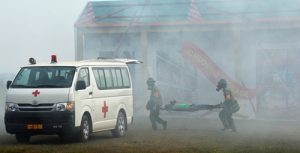Over the weekend, Vietnam and Cambodia inked a new security cooperation plan. The signing of the agreement highlighted the defense aspect of the wider relationship between the two countries as well as how they continue to manage the opportunities and challenges therein amid wider domestic and regional developments.
Cambodia and Vietnam, two neighboring Southeast Asian states, share a defense relationship as part of their wider diplomatic ties. Apart from the fact that Vietnam provides the Royal Cambodian Armed Forces (RCAF) with military equipment, infrastructure, and training, both countries have also looked to manage more sensitive areas of the relationship such as outstanding issues over their shared 700-mile long border, illegal fishing, and China’s growing influence in mainland Southeast Asia.
That has continued on over the past few months as well, including through the holding of review meetings at the end of 2019 and at the start of 2020. Over the weekend, the security aspect of Cambodia-Vietnam relations was in the headlines again with the visit of Cambodia’s deputy prime minister and interior minister to Cambodia. Sar Kheng was on a working visit to Vietnam which lasted from January 17 to January 19.
Sar Kheng’s visit saw him and his delegation participate in a series of interactions, including a meeting with Vietnam’s minister of public security, To Lam, that took place on January 17. After both ministers had reviewed the state of their security collaboration in 2019 and discussed wider issues including Vietnam’s ongoing roles as both ASEAN chair and a holder of a non-permanent United Nations Security Council seat, among the outcomes of the meeting was the signing of a cooperation plan for 2020 in the security realm.
Per a statement following the interaction, the cooperation plan saw both sides agree to pay attention to a range of important security issues of mutual interest. This included preventing illegal border crossings, finalizing border demarcation, and cracking down on cross-border crimes, with a focus on drug trafficking, forest crimes, and natural resource crimes in border provinces. Sar Kheng also noted on Facebook that the plan could see collaboration in other areas including greater cooperation between the security forces by both sides in exchanges, training, and medical treatment.
The signing of the plan itself comes as no surprise: such cooperation plans are an annual feature of the bilateral security relationship. And as with previous documents of this ilk, the key will be less about the commitments made by both sides and more about how they translate it into reality to make inroads on issues that have proven challenging to address previously for various reasons, including political differences as well as capacity issues. Nonetheless, the document did highlight efforts by both sides to continue to attempt to further collaboration in spite of the challenges they face.































